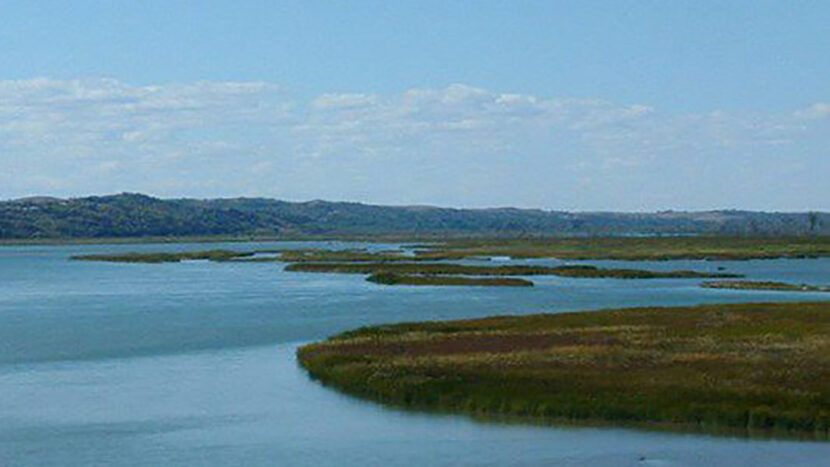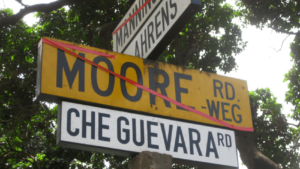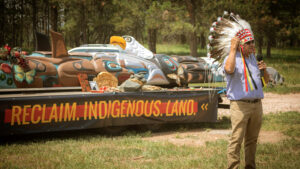We invite you to join the House of Tears Carvers and our partners on the Red Road to DC at a blessing ceremony for the Missouri River on Thursday, July 22nd, 2021, as we continue our journey to draw attention and action to sacred sites and Indigenous rights.
This event is open to the public; you may RSVP to join us in-person on Facebook. (Livestream availability will be dependent on day-of conditions, as will the exact start time – RSVP to be notified when the Livestream is available and always check our social media accounts for updates and notifications.)
The program from 9am to 12:30pm will center the discussion on the rights of the Missouri River. Then, from 1:30pm-5:30pm, we will welcome the totem pole and carvers to share about their journey to bring attention to the importance of sacred sites and hold a prayer ceremony of Unification for the Red Road to DC Journey. A special performance will be done by artists, singer and danger Jackie Bird. The event is hosted by the Ihanktonwan Treaty Committee, Yankton Sioux Business and Claims Committee, Brave Heart Society and in cooperation with the Red Road to DC Totem Pole partners.
The Missouri River
Dakota/Lakota/Nakota communities are working to pass a resolution recognizing the sovereignty and rights of the Mni Sosa (Missouri River.) The Missouri River is currently managed for economic imperatives, rather than ecological or culturally competent imperatives. The goals are: to restore the rights of the spirit of their river through promulgation of resolutions for local Traditional Societies, Oceti Sakowin Tribal Governments, and regional Tribal Alliances; to continue and complement their current Biocultural Region work to re-indigenize the landscape and hydroscape; and to protect their river from conflicts over water that have been prophesized, and establish buffer zones that they create with their Indigenous narrative in the Missouri River Watershed.
The Yankton Sioux are confronting threats to the Missouri River Cultural Bioregion that include the building of the Keystone XL pipeline and “man-camps” of pipeline workers, and the continuing pandemic in a state that refuses to follow public health guidelines and openly promotes racism and violates the principles of tribal sovereignty. Historically, federal environmental policy and leadership have favored extractive industries.
Traditional leaders want to restore the Ihanktonwan inherent Indigenous rights to be caretakers of the land and water of the region—a model for advancing tribal sovereignty in environmental and cultural protection through braiding thousands of years of knowledge and contemporary science to exercise the legal and inherent right to govern in the interests of humanity.
RESOURCES
Brave Heart Society
MORE ON THE #RedRoadtoDC
This summer, the House of Tears Carvers of the Lummi Nation are transporting a 24-foot totem pole they carved from Washington State to Washington D.C.. As this pole travels it draws lines of connection–honoring, uniting and empowering communities working to protect sacred places. It carries the spirit of the lands it visits and the power and prayers of communities along the way. In this moment of self-reflection across the United States and the acknowledgment of past and present injustices inflicted on Native Peoples and lands without consent, we invite all peoples to stand united with us to protect sacred places, and fulfill our ancestral and historic obligations to the First Peoples of these lands and waters.
This journey and our partners recognize an historic opportunity. With a new federal administration—including the first Native American to lead the Department of the Interior, the Executive Orders issued, Supreme Court decisions affirming tribal rights, and the urgency of climate crises, now is the time to implement policies to protect, restore, and renew sacred places, lands and waterways; and redefine the principles that shape land and water regulation and management in the United States on the basis of tribal sovereignty and Nation to Nation relations.
In July, the delivery of a totem pole from Lummi carvers and spiritual leaders to the new Administration, along with events in Washington, D.C., will be the summit of a cross-country tour connecting twenty of the country’s Native-led struggles where sacred lands, waters, and wildlife are imperiled by dams, climate change, and extractive industries. Ceremonial welcomes, online “virtual journey” events and live-streamed outdoor events, and media-making from the road will build support for the sovereign right of tribal nations to shape local and federal solutions, and to act on our collective ancestral responsibility to protect sacred places and the natural world for generations to come.







